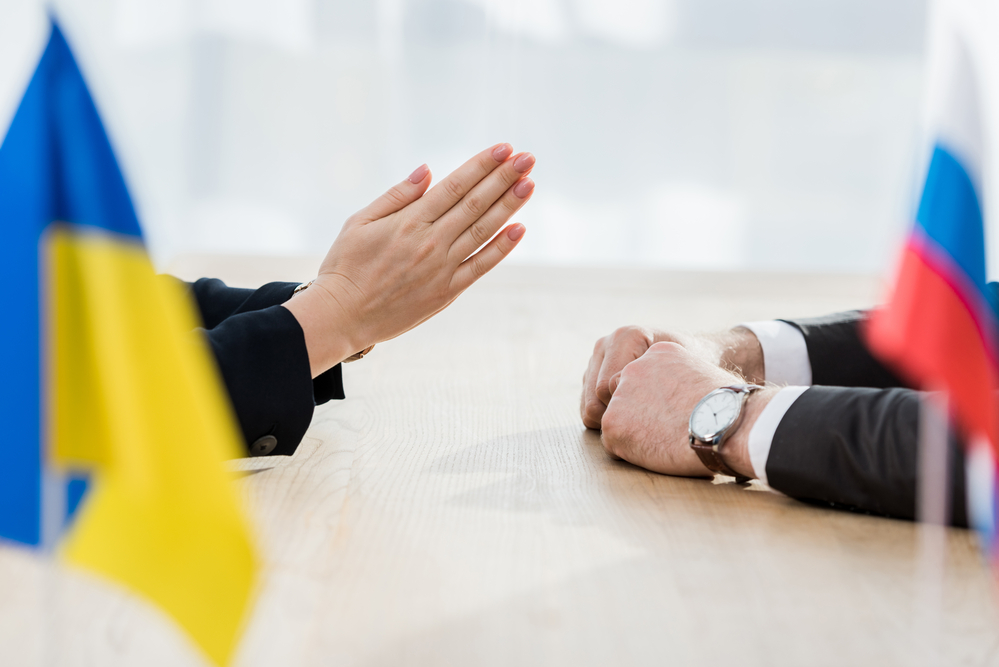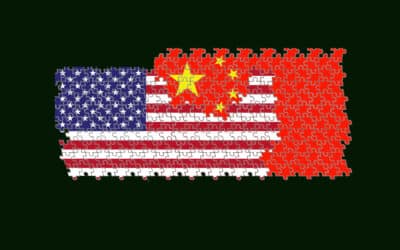The accepted Western narrative is that, in February 2022, Russia launched a full-scale invasion of Ukraine with the intent of conquering the entire country. But there is a competing narrative that is compelling enough to be worthy of consideration.
Following the United States’ rebuff of their December 2021 proposal on mutual security guarantees, which included a written guarantee that Ukraine would not become a member of NATO, Russia launched a limited invasion of Ukraine that included only 120,000-190,000 troops, a force far smaller than Russia knew would be necessary to conquer the whole of the country. The intent was not to absorb Ukraine but to terrify its government into signing a guarantee that they wouldn’t accept an invitation to join NATO (since NATO already refused the agreement promising not to invite them).
They very nearly succeeded. In the days following the beginning of the war, Ukraine was quick to come to the table to engage in negotiations with Russia. It was only after these talks broke down that Russia committed more troops and resources to the war.
That makes the question of why those promising talks to end the war failed as important as the question of why the war was started in the first place. While Russia bears the largest share of the blame for starting the war, whoever bears the largest share for ensuring its continuation holds partial responsability for the subsequent devastation.
Three theories have been advanced. The first stresses the traumatic effect of the discovery of atrocities in Bucha. The second stresses Ukrainian agency. The third stresses the blocking intervention of the United States and the United Kingdom.
Oleksiy Arestovych, the former Advisor to the Office of the President of Ukraine, was a member of the Ukrainian negotiating team in Istanbul. He says that the talks in Istanbul were successful and could have worked. He says that the Istanbul agreement was 90% prepared and that what remained was “the question of the amount of Ukrainian armed forces in peacetime.”
But they ultimately did not succeed. Arestovych allows the Western intervention theory of why the talks ended, but he also allows the Bucha one. Ukrainian President Volodymyr Zelensky “was shocked.” He says that “Zelenskyy completely changed face when he came into Bucha and saw what had happened.”
But there are several lines of evidence that suggest that Bucha had little to do with the death of the diplomatic talks. The timelines are confusing and may refer to different rounds of talks; some suggest that the decision to terminate the talks preceded the discovery at Bucha; some suggest that they went on despite the discovery at Bucha. But they agree that the death knell for the talks may not have been Bucha.
Former German Chancellor Gerhard Schröder, who played a mediating role in the Istanbul talks at the request of Ukraine, says that “nothing was known about Bucha during the talks with Umjerov,” a key Ukrainian negotiator, “on March 7 and 13.”
The same point is made in a report compiled by a former UN Assistant Secretary-General in UN peace missions, NATO and Germany’s retired highest-ranking general, and a professor emeritus of political science from Freie University in Berlin. They say that “Ukraine’s decision to abandon negotiations may have been taken before the discovery of a massacre of civilians in the town of Bucha near Kiev.”
There is also evidence that Ukraine, and Zelensky personally, were willing to continue the talks even after the discover of Bucha.
On April 5, 2022, the day after Zelensky visited Bucha, he told Ukrainian journalists that what happened in Bucha was “unforgivable” and will make “the possibility of negotiations…a challenge.” But, he added even after Bucha, “You have to do it. I think that we have no other choice.”
Ukrainians seem to have agreed with their president. Sociologist Volodymyr Ishchenko, research associate at the Institute of East European Studies, Freie Universität Berlin, reports that “the most systematic evidence we have shows that the public opinion in Ukraine was favorable to the negotiations with Russia to end the war even after Bucha. A poll commissioned by NDI in May 2022 showed that 59% of Ukrainians supported negotiations with Russia.”
“Remarkably,” Samuel Charap and Sergey Radchenko report, after the discovery at Bucha in early April, “the two sides continued to work around the clock on a treaty that Putin and Zelensky were supposed to sign during a summit to be held in the not-too-distant future,” suggesting that it was not Bucha that terminated the talks. Drafts of the treaty were still being worked on by the two sides as late as April 12 and April 15, ten days after Zelensky had visited Bucha.
Charap and Radchenko say that the talks not only continued after the discovery at Bucha, they “even intensified.” They conclude that the discovery of atrocities at Bucha were no more than “a secondary factor in Kyiv’s decision-making” about aborting the talks.
If Bucha was not the deciding factor in pulling the plug on the talks, what was? Several analysts stress the importance of Ukrainian agency. They frequently cite Kiev’s growing confidence after Russia withdrew its troops from the vicinity of Kiev in the early days of the war and their lack of trust in Russia.
Charap and Radchenko say that Ukraine was unwilling to discuss certain Russian demands that were not included in the Istanbul communiqué, like the requirement to ban “fascism, Nazism, neo-Nazism, and aggressive nationalism.” They conclude, though, that these demands were probably of limited significance. Several members of the Ukrainian delegation provide first hand testimony that these details were what Davyd Arakhamiia, who led the Ukrainian negotiating team, called “seasoning.” Along with then-Israeli Prime Minister Naftali Bennett, an intermediary in the talks, Arakhamiia says that a promise not to join NATO was the “key point.” Zelensky said that the promise not to join NATO was “the first fundamental point for the Russian Federation.”
Charap and Radchenko say that Russia’s withdrawal from Kiev’s periphery “stiffened Zelensky’s resolve, removing an immediate threat to his government, and demonstrated that Putin’s vaunted military machine could be pushed back, if not defeated, on the battlefield.”
A companion of the Ukraine agency theory is that the United States was reluctant to sign on to security agreements that Ukraine’s diplomacy might commit them to and that might mean going to war with Russia if Russia ever invaded Ukraine again.
The weakness of the Ukraine agency explanation is not that it is wrong, but that it exaggerates agency into autonomy. Ukraine was on the verge of diplomatically accomplishing a peace that would have satisfied its goals. They could have moved forward or explored their new optimism by reverting to the war track. The United States may have had concerns with aspects of the agreement. But, rather than seizing the opening provided by the promising talks and encouraging Zelensky, they promised a newly optimistic Zelensky whatever it takes for as long as it takes and encouraged him to continue on the war track. Which leads into the third theory, that the United States and the United Kingdom stepped in and pushed Zelensky off the diplomatic path and back onto the path of war.
In their excellent study, Charap and Radchenko conclude that there were many factors that contributed to the termination of talks, including the United States’ “lukewarm response” and their concern with features of the agreement, Ukraine’s newfound miliary confidence, Bucha, and the diplomatic focus on a grand resolution before focussing on the practical details.
They say that “the claim that the West forced Ukraine to back out of the talks with Russia is baseless” because “it suggests that Kyiv had no say in the matter.” But that confuses agency with autonomy. Ukraine had a say in the matter. Ukraine’s contribution and agency cannot be dismissed. But that does not entail that they were not pushed.
In her positive review of the Charap and Radchenko analysis, Emma Ashford, senior fellow at the Stimson Institute, agrees that the situation “is a bit more complicated” than that the West directly sabotaged a completed ceasefire deal, but she says that the authors “pull their punches too much when analysing why the talks failed. For the authors simply to state that multiple factors contributed to the failure of the talks is unsatisfying, given the obvious implication that Ukraine—encouraged by western backing—decided to roll the dice on the future of the conflict.”
Ishenko also praises the Charap and Radchenko analysis, but points out, “Although the authors reject the cartoonish argument that the West ‘forced’ Zelenskyi to abandon the deal, they do not deny the ‘agency’ of Boris Johnson and the US elite and their share of responsibility for the failure of the talks.” He says, “The Western officials who dissuaded Zelenskyi from the peace deal and instead fueled exaggerated expectations of Ukraine’s victory with promises of support ‘for as long as it takes’ surely understood the consequences and who will pay most of the price.”
Many critics of the Western intervention theory simply state that the claim is baseless without providing evidence. Though they say the claim is baseless, Charap and Radchenko do say that, though it is not so simple, the “Western response to these negotiations…was certainly lukewarm.”
They say that “a former U.S. official who worked on Ukraine policy at the time” told them that, faced with concerns about the draft treaty, “instead of embracing the Istanbul communiqué and the subsequent diplomatic process, the West ramped up military aid to Kyiv.” The West could have seized on the draft—complete with its problems—and encouraged the obvious possibility of talks. Instead, they promised Zelensky, freshly optimistic about Ukraine’s military chances, with all the military aid he would need.
They also recognized that Boris Johnson, “disinclined toward diplomacy,” told Zelensky that “any deal with Putin…would be some victory for him: if you give him anything, he’ll just keep it, bank it, and then prepare for his next assault” and that “willingness to engage diplomatically with Russia” was not “a priority for the United States and its allies.” The Americans, they say, “did not appear to consider [diplomacy] central to their response to Russia’s invasion” and “the willingness…to undertake high-stakes diplomacy…has been notably absent in Washington and European capitals.”
Instead of diplomacy, the West pushed for and promised support for war. It is “true,” Charap and Radchenko say, that “the West’s offers of support must have strengthened Zelensky’s resolve, and the lack of Western enthusiasm does seem to have dampened his interest in diplomacy.”
The problem with the rejection of the Western intervention explanation is not just that it is asserted without evidence, but that it ignores the quorum of participants in the talks who offer first hand testimony that the West did block the negotiations.
Davyd Arakhamiia has confirmed that “when we returned from Istanbul, Boris Johnson came to Kiev and said that we would not sign anything with them at all, and let’s just fight.” In December 2022, Ukrainska Pravda reported that on April 9, 2022, Johnson hurried to Kiev to tell Zelensky that Putin “should be pressured, not negotiated with” and that, even if Ukraine was ready to sign some agreements with Russia, “the West was not.”
The United States and its Western partners were not encouraging Ukrainian negotiations that could satisfy Ukraine’s goals and end the war. As the State Department explained, there were “core principles” at stake that made the war “bigger than Russia” and “bigger than Ukraine.”
Then-Israeli Prime Minister Naftali Bennett and Former German Chancellor Gerhard Schröder both acted as intermediaries to the talks at the request of Ukraine. Bennet says that “there was a good chance of reaching a ceasefire,” but the West “blocked it.” Schröder agrees: “Nothing could happen because everything else was decided in Washington…[T]he Ukrainians did not agree to peace because they were not allowed to. They first had to ask the Americans about everything they discussed.”
Turkey played host to the main talks. Turkish Foreign Minister Mevlut Cavusoglu says that the talks were on course to end the war, but that “There are countries within NATO who want the war to continue.” “Following the NATO foreign ministers’ meeting,” he explained, “it was the impression that… there are those within the NATO member states that want the war to continue, let the war continue and Russia get weaker.”
The deputy chairman of Turkey’s governing party, Numan Kurtulmus, reports the same thing: “In certain matters, progress was made, reaching the final point, then suddenly we see that the war is accelerating…Someone is trying not to end the war. The United States sees the prolongation of the war as its interest…There are those who want this war to continue…Putin-Zelensky was going to sign, but someone didn’t want to.”
And former UN Assistant Secretary-General in UN peace missions Michael von der Schulenburg says that “NATO had already decided at a special summit on March 24, 2022, not to support these peace negotiations.”
Arakhamiia has also said that the West “actually advised us not to go into ephemeral security guarantees.”
In judging the Western contribution to the termination of the peace talks, these first-hand testimonials cannot be ignored. That does not dismiss Ukrainian agency or Zelensky’s growing confidence. But it does mean that the United States and the United Kingdom played a fatal role in the decision. The U.S. did not prioritize diplomacy, and at a juncture at which Ukraine and Russia had demonstrated that diplomacy was, at least, possible, the U.S. opted for promising Zelensky aid for a military solution instead of support for a diplomatic one.
There is no evidence that the United States did not force Ukraine to abandon the talks—even if Zelensky’s confidence did facilitate and contribute to the decision—and plenty of evidence that the West’s promise of all the aid he needed for as long as he needed encouraged Zelensky to opt for war over diplomacy, while the lack of support for the diplomatic track dampened his interest in it. And there is plenty of first-hand testimony that the United States and the United Kingdom went so far as to say “no.”
































